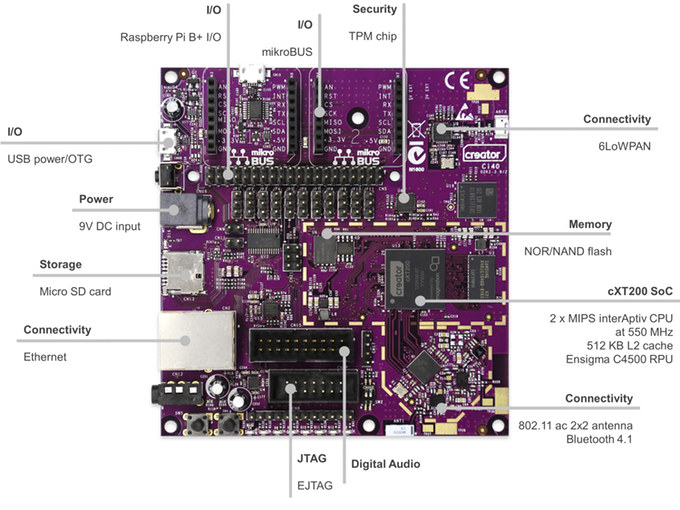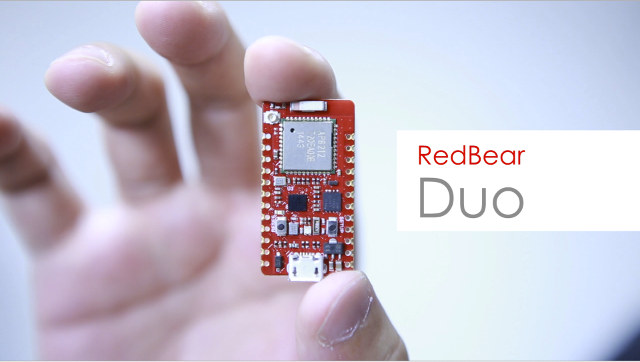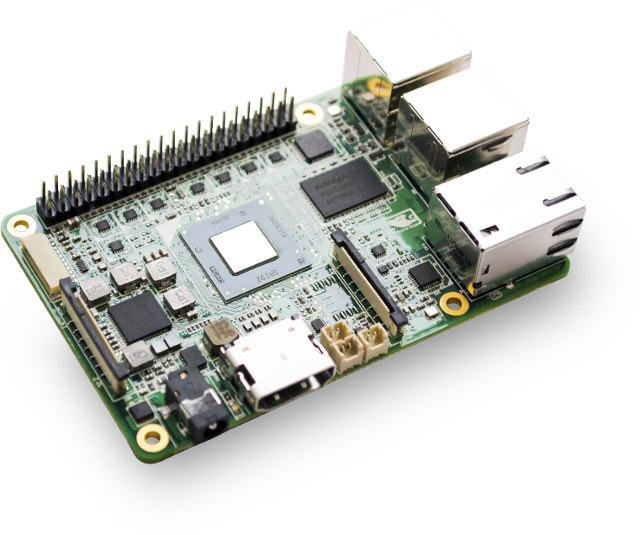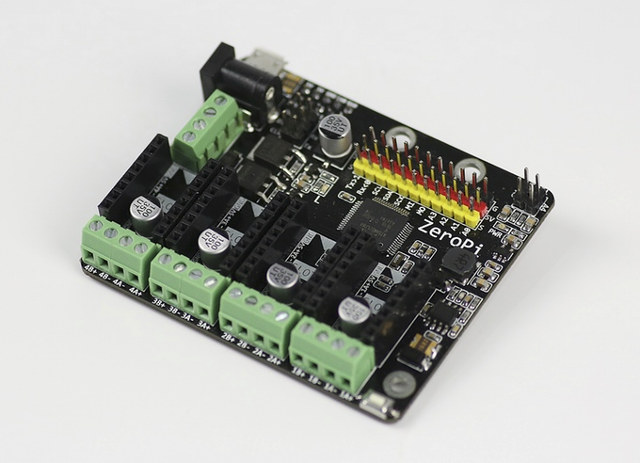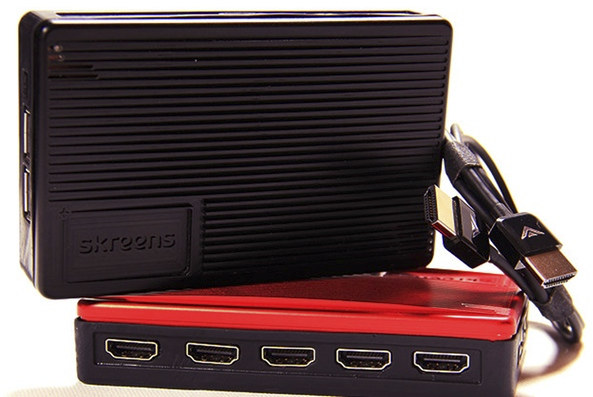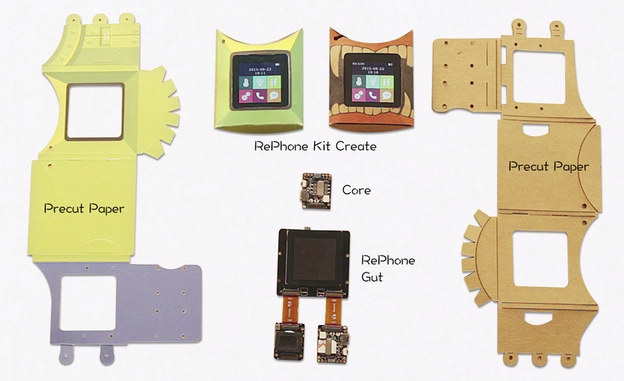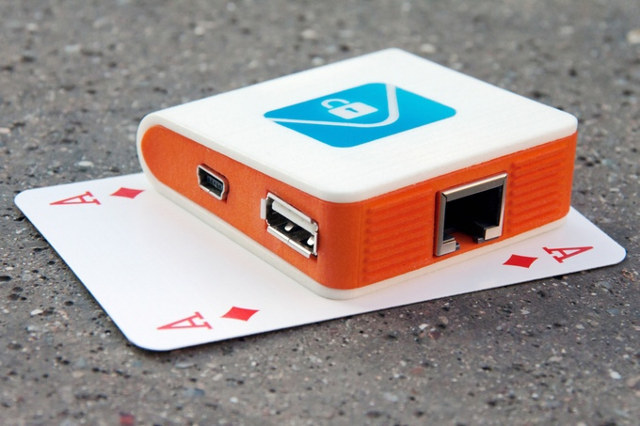Last year, Imagination Technologies launched their first community development board with MIPS Creator CI20 powered by Ingenic JZ4780 dual core MIPS processor running both Android and Linux, and now supported by various projects. The company has been teasing about its MIPS Creatort Ci40 for a few weeks, and was already announced as the MIPS platform of choice for Google Brillo operating system, but the board has now officially been launched via a Kickstarter campaign where you can get the board for $53, as well as some add-on boards. But instead of using a processor from one of their partner, Imagination just designed their own MIPS interAptiv SoC for the board. Creator Ci40 board specifications: SoC – Imagination Technologies Creator cXT200 with 2x MIPS interAptiv core @ 550MHz, 512KB L2 cache, and an Ensigma C4500 RPU (for 802.11ac/ BT 4.1 LE) System Memory – 256 MB DDR3 Storage – 512 MB […]
RedBear Duo is a Breadboard-friendly Wi-Fi + BLE IoT Board Based on Ampak AP6212 Module (Crowdfunding)
I’ve taken apart lots of TV boxes and together with Realtek, Ampak are by far the most popular wireless modules to provide WiFi and Bluetooth connectivity in those devices. One startup decided to use Ampak AP6212 module, also found in NanoPi 2 board, to create a breadboard-friendly IoT board with Bluetooth 4.0 and 802.11b/g/n connectivity. Redboard Duo has been designed with the same form factor as many other IoT boards such as NodeMCU or Spark Photon, and features the following: Ampak AP6212 module: STMicroelectronics STM32F205 ARM Cortex-M3 @120MHz, 128 KB SRAM and 1MB Flash Broadcom BCM43438 Wi-Fi 802.11n (2.4GHz only) + Bluetooth 4.1 (Dual Mode) combo chip Storage – On-board 16 Mbit (2 MB) SPI Flash Integrated chip antenna with the option to connect external antenna Expansion – Headers with 18 I/O pins Misc – RGB status LED Dimensions – 20.5mm x 39mm The company also made a small baseboard called RBLink with […]
UP Board is a Raspberry Pi Clone with an Intel Atom X5 Processor (Crowdfunding)
Many ARM based “insert-fruit-name-here” Pi boards are available on the market, and they all look like the Raspberry Pi board to some extends, but thanks Emutex we’ll soon get the “UP board” powered by Intel Atom x5-Z8300 and in Raspberry Pi form factor including the ubiquitous 40-pin Raspberry Pi headers, DSI and CSI connectors, and mostly the same port placements, with some extra goodies like a USB 3.0 port and Gigabit Ethernet. Up Board specifications: SoC – Intel Atom x5-Z8300 “Cherry Trail” quad core processor @ 1.44 GHz (Burst frequency: 1.84 GHz) with Intel Gen8 HD graphics @ 500 MHz System Memory – 1 GB DDR3L-1600 Storage – 16 or 32 GB eMMC Video Output / Display – HDMI, DSI connector Audio I/O – HDMI Connectivity – Gigabit Ethernet USB – 4x USB 2.0 host ports, 1x USB 2.0 pin header, 1x micro USB 3.0 port (under the board) Camera […]
BLOCKS Modular Smartwatch Replaces the Watchband With Smart Modules (Crowdfunding)
While Project Ara aims to create a modular smartphone, the guys behind BLOCKS have designed a modular smartwatch with the Core (the main watch) and various hot swappable smart modules that clip together with a clasp make the watch band. BLOCKS’ Core specifications: SoC – Qualcomm Snapdragon 400 processor System Memory – 512 MB RAM Storage – 4GB flash (ePoP) Display – 1.36″ round display, resolution: 360 pixels diameter Connectivity – 802.11 b/g/n and Bluetooth 4.0 Sensors – Accelerometer / Gyro Audio – Microphone Misc – Power button, vibration motor IP Rating – IP67 (but target is IP68) Battery – 400 mAh battery; good for ~1.5 days on a charge Dimensions – TBD Weight – TBD So the Core module is already a standalone smartwatch on its own, and they do provide one without module, but just a simple strap. The watch runs a modified version of Android Lollipop, and […]
ZeroPi is an Arduino & Raspberry Pi Compatible Motor Control Board (Crowdfunding)
Pi boards keep on coming… As soon as I finished writing about Roseapple Pi board, yet another one popped out on my twitter feed… But that one is of a different kind, as it won’t run Linux, but instead the board is powered by an Atmel SAMD21 Cortex M0+ micro-controller, and can support lots of electric motors including up to 11 micro servos and 8 DC motors – or 4 stepper motors – simultaneously. ZeroPi board specifications: MCU – Atmel SAMD21J18 ARM Cortex M0+ @ 48 MHz with 32 SRAM and 256KB flash I/O pins via 33-pin header, 4-pin temperature sensor, and 10-pin Raspberry Pi header 35 GPIOs 4x 12-bit ADC channels 1x 10-bit DAC 2x UART 2-channel temperature sensor interface DC current per I/O pin- 7mA DC / Stepper Motor control – 4x 4-channel SLOT interface compatible with common parts such as DRV8825 or A4988 Stepper motor driver and […]
Skreens are Configurable Picture-in-Picture HDMI Splitters (Crowdfunding)
Some HDMI splitters support picture-in-picture (PiP) to display of the video input full screen, and the others in small windows, and the ones I checked just cost under $30 on Amazon here, there, and over there. People who only use them as splitters are satisfied, but the ones who tried the PiP function are disappointed, as the other inputs, usually 3, are only shown in small windows on one of the corner of the TV, and not that useful. If you want more customizable PiP, Skreens could be what you are looking for, as the HDMI inputs can be resized and positioned via a mobile app. There are basically two models named by their number of inputs: NexusTwo, and NexusFour, with Pro versions bringing the total to 4 models. Skreens NexusTwo specifications: Chip(s) – Xilinx Kintex-7 Field Programmable Gate array with Dual ARM Cortex-A9 @ >1 GHz with NEON (Over […]
RePhone Kit Create is a DIY Phone and Cellular Development Kit (Crowdfunding)
Seeed Studio has design a modular and open source phone it calls RePhone Kit Create. The kit allows you, or/and your kid(s), to assemble their own phone based on building blocks including a 2G or 3G core module, a touchscreen display module, an audio module, and pre-cut, seawable, washable, and easily drawable Kraft paper to make the case. The kit can also be used for IoT applications using cellular and Bluetooth connectivity, and extra Xadow modules GPS, NFC, motion sensors, camera and more.. Two cellular “core” module can be used: RePhone GSM + BLE module with the “world’s smallest System-on-Chip (SOC) for Wearables and Internet Of Things”, GSM, GPRS and Bluetooth 2.1 and 4.0 support. RePhone Core Module 3G with a “powerful microcontroller”,a standard Xadow interface (USB, GPIO, I2C, SPI, UART, EINT), support for speaker, two microphones and a headset, a Nano SIM, and support for HSPA/WCDMA:850/1900 and GPRS/EDGE:850/1900. Voltage: […]
Own-Mailbox is a Tiny, Secure, and Open Source Hardware Mail Server (Crowdfunding)
Email encryption has been around for a while, but virtually nobody uses it, because it’s quite complex to setup, and your recipients email clients, apps or browsers must also support encryption. Revolutek aims to simplify the setup and usage of encrypted email with their “Own-Mailbox” based on open source hardware and software technology. The hardware solution could have been based on the Raspberry Pi board in theory, but the popular board requires a closed source binary to boot, documentation about part of the hardware is lacking, and once the enclosure, and required accessories are included the price would have been higher. So instead they decided to design their own hardware based on an Allwinner processor: SoC – Allwinner A13 Cortex A8 processor @ 1GHz System Memory – 256 MB RAM Storage – (micro?) SD card slot with 16GB card included Connectivity – 10/100M Ethernet (Lan9500A controller) USB – USB host […]


